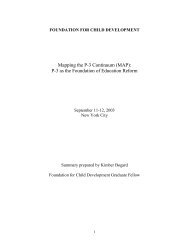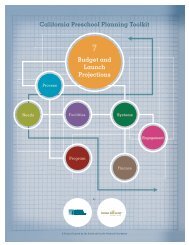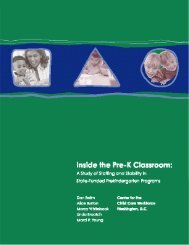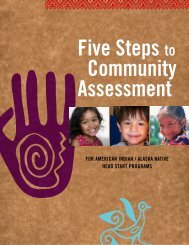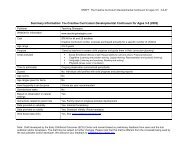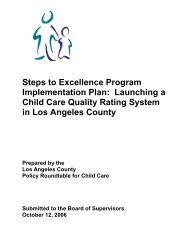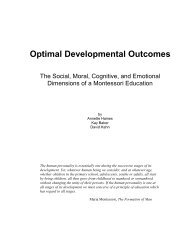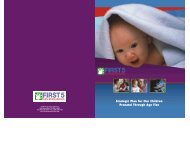Download this file - Plan4Preschool
Download this file - Plan4Preschool
Download this file - Plan4Preschool
You also want an ePaper? Increase the reach of your titles
YUMPU automatically turns print PDFs into web optimized ePapers that Google loves.
Youth development shifts the focus from deficits to assets and from fixing negative<br />
behaviors to building youths’ strengths. Research has found that critical developmental<br />
assets for youths include a caring school climate, clear rules and consequences in the<br />
school, high expectations from teachers, and bonding to the school.<br />
Resilience is a capacity for healthy development innate to all people. Young people are<br />
naturally motivated to want their human needs for love, belonging, respect, identity,<br />
power, mastery, challenge, and meaning met. When young people experience school<br />
environments rich in opportunities to experience caring relationships, high expectations,<br />
and meaningful participation, these needs are met. All schools can measure the extent<br />
to which their students experience these assets by using the Healthy Kids Survey’s<br />
Resilience & Youth Development Module (RYDM). For more information regarding<br />
resilience and youth development, visit the WestEd Web site at<br />
http://www.wested.org/pub/docs/hks_resilience.html.<br />
Creating a positive school climate, one that fosters students’ engagement in learning<br />
and connection to school, requires a schoolwide approach that includes:<br />
• An emphasis on caring relationships between adults and youths and prosocial<br />
cooperation among students<br />
• Planning and classroom management that involves listening to youth voices,<br />
taking their perceptions into account, and providing students with decision-making<br />
roles<br />
• Opportunities for peer leadership, peer helping programs, youth advocacy, <br />
service-learning, and other forms of meaningful participation <br />
• Training for school staff in youth development concepts, including the critical <br />
importance of having high expectations that all students can succeed in a <br />
standards-based approach to instruction <br />
The research described above is more fully summarized in the Getting Results:<br />
Updates 1 and 5 that can be found on the Getting Results Web site at<br />
http://www.cde.ca.gov/re/pn/fd/gettingresults.asp.<br />
For more information regarding youth development, contact Greg Wolfe, Safe and<br />
Healthy Kids Program Office, at (916) 319-0920 or by e-mail at gwolfe@cde.ca.gov.<br />
Additional information is also available on the Youth Development Web site at<br />
http://www.cde.ca.gov/ls/yd.<br />
After School Programs<br />
After school programs play an increasingly critical role in providing a safe environment<br />
for students during nonschool hours and supporting them in meeting and exceeding<br />
state academic standards. Before and after school programs are created through<br />
partnerships between schools and local community resources to provide support for<br />
literacy, academic enrichment, and safe and constructive environments for students.<br />
Grant funding for each fiscal year is contingent upon the availability of funds and the<br />
enactment of each respective federal and state Budget Act. When grant funding is<br />
69



